 Petzlover
Petzlover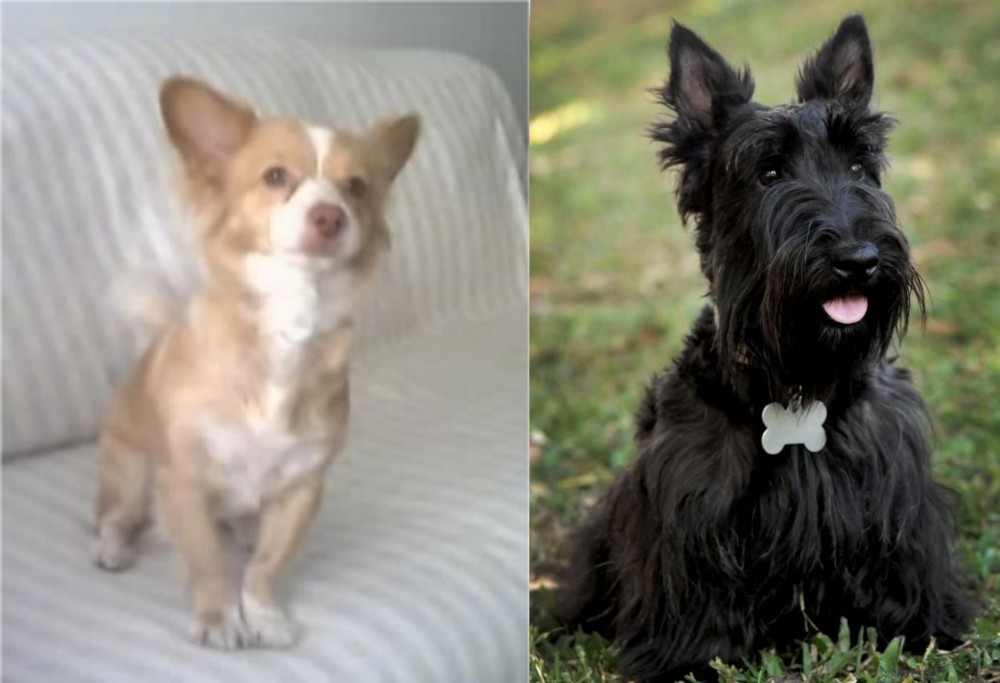 Alopekis is originated from Greece but Scoland Terrier is originated from United Kingdom. Both Alopekis and Scoland Terrier are having almost same height. Alopekis may weigh 20 kg / 45 pounds more than Scoland Terrier. Both Alopekis and Scoland Terrier has same life span. Alopekis may have less litter size than Scoland Terrier. Alopekis requires Moderate Maintenance. But Scoland Terrier requires High Maintenance
Alopekis is originated from Greece but Scoland Terrier is originated from United Kingdom. Both Alopekis and Scoland Terrier are having almost same height. Alopekis may weigh 20 kg / 45 pounds more than Scoland Terrier. Both Alopekis and Scoland Terrier has same life span. Alopekis may have less litter size than Scoland Terrier. Alopekis requires Moderate Maintenance. But Scoland Terrier requires High Maintenance
 The courageous Alopekis is said to have run with and fought with bulls. To this day they escort bulls in Greece. They were used by the Greeks to contain the vermin populations, guard the chickens and ducks, and assist larger dogs in working with sheep. At one time it was thought that they originated from breeding of dogs and foxes, but this proved not to be true. It was also once considered to be the same breed as the Small Greek Domestic Dog, but it has since been declared its own breed.
The courageous Alopekis is said to have run with and fought with bulls. To this day they escort bulls in Greece. They were used by the Greeks to contain the vermin populations, guard the chickens and ducks, and assist larger dogs in working with sheep. At one time it was thought that they originated from breeding of dogs and foxes, but this proved not to be true. It was also once considered to be the same breed as the Small Greek Domestic Dog, but it has since been declared its own breed.
The Alopekis is not a recognized breed with any of the current national or international dog organizations. The Kennel Club of Greece will recognize them once their population is large enough. They cannot be recognized by the AKC, IKC, or International groups until they are a much larger group.
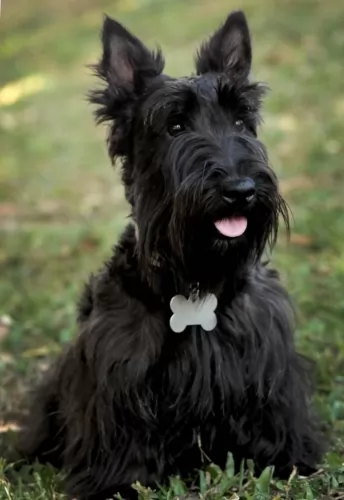 Not much is known about the Scoland Terrier. It is not a purebred but rather a crossbreed developed by crossing the Scottish Terrier with the Westland Terrier. To understand these mixed breeds, look to the original breeds for any combination of the characteristics of the breeds. The offspring of this crossing is not a 50-50 split of the original breeds looks or temperament.
Not much is known about the Scoland Terrier. It is not a purebred but rather a crossbreed developed by crossing the Scottish Terrier with the Westland Terrier. To understand these mixed breeds, look to the original breeds for any combination of the characteristics of the breeds. The offspring of this crossing is not a 50-50 split of the original breeds looks or temperament.
Because the Scoland Terrier is a mix between the Scottie and the Westie he has all the characteristics of a typical terrier perhaps even twice as much. With both parents being terriers, you can expect your Scoland to act like a short legged terrier. These dogs are known for their courage and tenacity. Today these terriers are family companions. Most terriers today come from a pool of ancestral dog in the 19th century in Europe. This information was gleaned from a genetic analysis done in 2006.
The Scoland Terrier, being a hybrid, is not acknowledged by the American Kennel Club (AKC) or the United Kennel Club (UKC). It is acknowledged by the International Designer Canine Registry (IDCR), American Canine Hybrid Club (ACHC), Dog Registry of America, Inc. (DRA), Designer Dogs Kennel Club (DDKC) and Designer Breed Registry (DBR).
 The Alopekis is a small, fox-like dog with pricked ears on a head that is wedge shaped. They have large eyes, a deep and tapered muzzle with a broad nose. They are short but have long backs and a deep, wide chest with strong legs and feet. They have a beautiful tail that cures upward and a double coat.
The Alopekis is a small, fox-like dog with pricked ears on a head that is wedge shaped. They have large eyes, a deep and tapered muzzle with a broad nose. They are short but have long backs and a deep, wide chest with strong legs and feet. They have a beautiful tail that cures upward and a double coat.
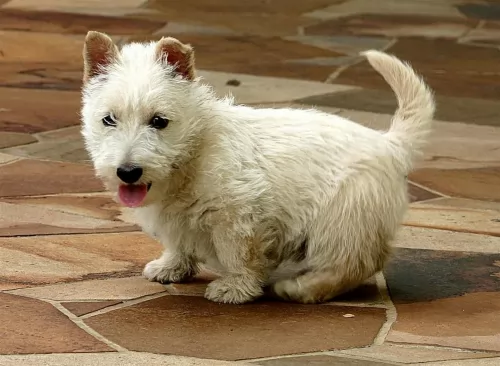 Being a hybrid, the Scoland Terrier will not always look alike and could look like a Scottie, a Westie or a combination of the two. Most breeders of this designer dog say it usually has a body like the Scottie and a round head like the Westie. They are more often black with white markings, but they can often be wheaten as well. With round dark eyes, a scissors bite and black nose, her face is unique. The breed has erect and small, triangular ears and a medium fluffy tale. The coat is hard and wiry, with a dense soft undercoat.
Being a hybrid, the Scoland Terrier will not always look alike and could look like a Scottie, a Westie or a combination of the two. Most breeders of this designer dog say it usually has a body like the Scottie and a round head like the Westie. They are more often black with white markings, but they can often be wheaten as well. With round dark eyes, a scissors bite and black nose, her face is unique. The breed has erect and small, triangular ears and a medium fluffy tale. The coat is hard and wiry, with a dense soft undercoat.
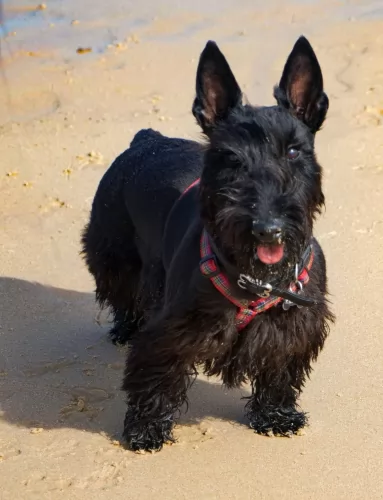 1.Children friendliness - they can be very good with children and children can help them get their exercise.
1.Children friendliness - they can be very good with children and children can help them get their exercise.
3.Adaptability - yes but she is adept at digging and must have a safe enclosure.
 The Alopekis is an endangered species of canine due to a variety of factors. Traditionally this has been a healthy gene pool and the breed has been an example of the evolution of small canines. Factors such as farm pesticides, urbanization and cross breeding have affected the breed’s future.
The Alopekis is an endangered species of canine due to a variety of factors. Traditionally this has been a healthy gene pool and the breed has been an example of the evolution of small canines. Factors such as farm pesticides, urbanization and cross breeding have affected the breed’s future.
This is made worse by the fact that the female Alopekis only breeds once a year, the litters are small, and the puppy mortality is high. In addition, the dogs are regularly neutered as part of a program to control strays, despite their status as an endangered species.
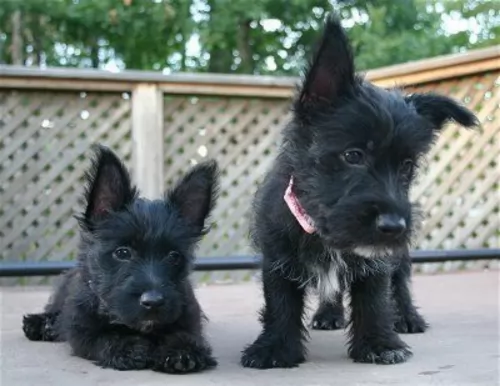 This hybrid dog can inherit any of the issues faced by its two parent breeds. For the Scoland Terrier this can include:
This hybrid dog can inherit any of the issues faced by its two parent breeds. For the Scoland Terrier this can include:
• Seborrhea – Skin disease that can cause dogs to scratch until bleeding and/or infected.
• Carniomandibular Osteopathy -called lion’s jaw this is a developmental disease that causes extensive changes in the bones of the mandible and skull.
• Pulmonic Stenosis – when the blood flowing from the heart’s right ventricul to the pulmonary artery is blocked.
• PPM or Persistent Pupillary Membranes - causes visual impairment when the membranes do not dissolve after birth.
• Chronic Hepatitis – disease of the liver that can eventually cause major damage.
 This is a high energy dog and the puppies need to be fed a high-quality puppy food. Feed about 1/3 of a cup twice a day.
This is a high energy dog and the puppies need to be fed a high-quality puppy food. Feed about 1/3 of a cup twice a day.
Feed high- quality dry dog food and dog treats to this active dog. Feed about ¼ of a cup twice a day – more if below average weight and less if overweight.
Keep them active and away from pesticides if possible.
This is a very active dog that needs a lot of exercise, games and if possible – a job.
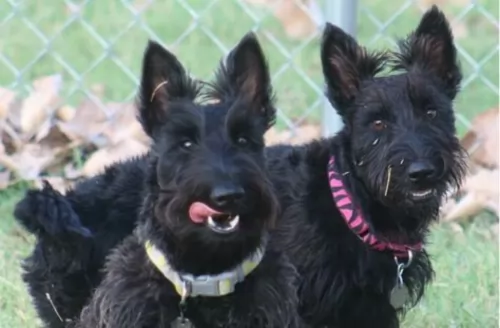 1.Feeding the puppy - Give a high quality puppy dog food designed for terriers or active medium sized dogs. Give ¾ of a cup over 3 meals a day.
1.Feeding the puppy - Give a high quality puppy dog food designed for terriers or active medium sized dogs. Give ¾ of a cup over 3 meals a day.
2.Feeding the adult – Give a high quality adult dog food designed for terriers or active medium sized dogs. Give one cup over two meals a day.
4. Games and Exercises – The Scoland Terrier is a very active dog and needs daily exercise, He need time to play, run, and be stimulated by games. She would be very good at flyball, Frisbee, fetch, agility, barn hunt, and obedience. He needs at least 2 hours of play and exercise everyday.